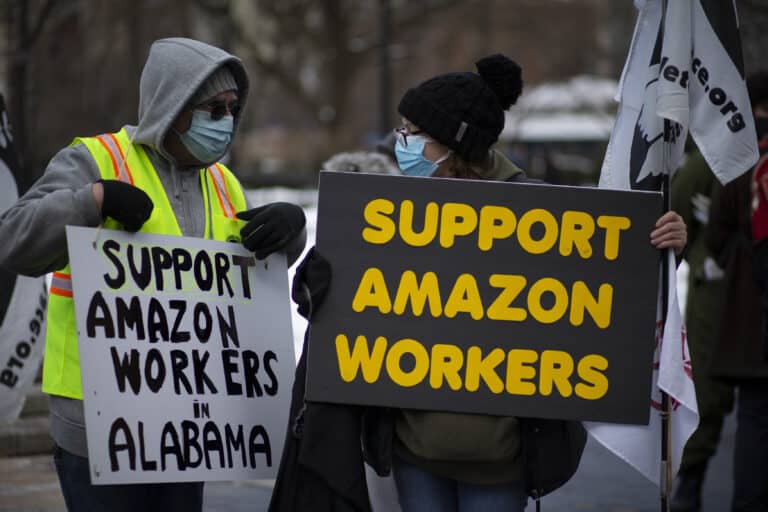
Andrew Strom is an Associate General Counsel of Service Employees International Union, Local 32BJ in New York, NY.
I recently proposed a Workers’ Bill of Rights, and invited others to respond with suggestions for other rights that should be included. I did receive some helpful comments, and in response I would propose adding three additional rights to the ones I had previously proposed:
A Right to Strike and Engage in Other Concerted Actions: These are the key rights protected by the National Labor Relations Act (NLRA), but, as James Gray Pope, Ed Bruno, and Peter Kellman recently pointed out, they often exist more in theory than in fact. There are many reasons for this, but at least in the private sector, here are some of the key ones: First, an employer’s ability to permanently replace striking workers, particularly when combined with a constant reserve of unemployed individuals, has virtually eliminated the strike as a viable weapon for most workers. Next, few workers are aware of their rights under the NLRA. When the Labor Board took a small step to address this ignorance by issuing a rule that required employers to post notices informing workers of their rights, employers succeeded in enjoining the rule. In addition, when employers interfere with these rights, it can take years to obtain a legal victory, and the victory is often hollow because the NLRA does not impose any penalties on employers.
A Right to Be Free from Discrimination: One of the places where we have made real strides in this country over the last forty years is in combatting race and sex discrimination in the workplace. It hasn’t gone away, and workers are still often too scared to speak up when their supervisors are the perpetrators, but most employers at least proclaim a commitment to fight race and sex discrimination. Unfortunately, in many cases this commitment to combat discrimination does not extend to discrimination based on sexual orientation or gender identity. The circuit courts are split on whether Title VII of the Civil Rights Act prohibits discrimination based on sexual orientation. Only about half the states outlaw employment discrimination based on sexual orientation and gender identity. Thus, while the Constitution may protect the right of same sex couples to marry, it does not prevent their employer from firing them for exercising that right.
A Right to a Remedy: One of the most basic principles in law is that there must be a remedy for every violation of a right. Yet, under current law, while undocumented immigrants are theoretically covered by workplace laws, they are not provided with a remedy if they are fired in violation of state or federal law. Even if you believe we need to do more to discourage immigrants from coming here or staying if they lack proper authorization, this makes no sense. No one comes to this country (or stays) because they hope that someday they will be fired and will be able to file a charge or a lawsuit that may eventually provide them with backpay. As long as we have millions of undocumented workers in this country, the rest of us need assurance that these individuals will have a reason to speak up when their employers violate worker protection laws. Apart from undocumented immigrants, more and more workers are losing access to the courts and to procedures that allow them to vindicate their legal rights. The Supreme Court has already allowed employers to replace jury trials with arbitration. Next year, the Supreme Court will decide whether employers may force workers to arbitrate their claims individually, rather than joining together to bring collective or class actions against their employer. Lawyers tend to gravitate toward cases where the most money is at stake, so low wage workers can have trouble finding lawyers willing to take their cases. But when workers can band together to file claims jointly, they can attract lawyers who can obtain justice for them.








Daily News & Commentary
Start your day with our roundup of the latest labor developments. See all
December 11
In today’s News and Commentary, Biden’s NLRB pick heads to Senate vote, DOL settles a farmworker lawsuit, and a federal judge blocks Albertsons-Kroger merger. Democrats have moved to expedite re-confirmation proceedings for NLRB Chair Lauren McFerran, which would grant her another five years on the Board. If the Democrats succeed in finding 50 Senate votes […]
December 10
In today’s News and Commentary, advocacy groups lay out demands for Lori Chavez-DeRemer at DOL, a German union leader calls for ending the country’s debt brake, Teamsters give Amazon a deadline to agree to bargaining dates, and graduates of coding bootcamps face a labor market reshaped by the rise of AI. Worker advocacy groups have […]
December 9
Teamsters file charges against Costco; a sanitation contractor is fined child labor law violations, and workers give VW an ultimatum ahead of the latest negotiation attempts
December 8
Massachusetts rideshare drivers prepare to unionize; Starbucks and Nestlé supply chains use child labor, report says.
December 6
In today’s news and commentary, DOL attempts to abolish subminimum wage for workers with disabilities, AFGE reaches remote work agreement with SSA, and George Washington University resident doctors vote to strike. This week, the Department of Labor proposed a rule to abolish the Fair Labor Standards Act’s Section 14(c) program, which allows employers to pay […]
December 4
South Korea’s largest labor union began a general strike calling for the President’s removal, a Wisconsin judge reinstated bargaining rights for the state’s public sector workers, and the NLRB issued another ruling against Starbucks for anti-union practices.